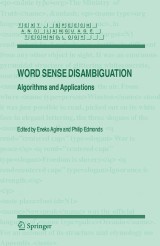Details

Word Sense Disambiguation
Algorithms and ApplicationsText, Speech and Language Technology, Band 33
|
96,29 € |
|
| Verlag: | Springer |
| Format: | |
| Veröffentl.: | 16.11.2007 |
| ISBN/EAN: | 9781402048098 |
| Sprache: | englisch |
| Anzahl Seiten: | 366 |
Dieses eBook enthält ein Wasserzeichen.
Beschreibungen
Graeme Hirst University of Toronto Of the many kinds of ambiguity in language, the two that have received the most attention in computational linguistics are those of word senses and those of syntactic structure, and the reasons for this are clear: these ambiguities are overt, their resolution is seemingly essential for any prac- cal application, and they seem to require a wide variety of methods and knowledge-sources with no pattern apparent in what any particular - stance requires. Right at the birth of artificial intelligence, in his 1950 paper “Computing machinery and intelligence”, Alan Turing saw the ability to understand language as an essential test of intelligence, and an essential test of l- guage understanding was an ability to disambiguate; his example involved deciding between the generic and specific readings of the phrase a winter’s day. The first generations of AI researchers found it easy to construct - amples of ambiguities whose resolution seemed to require vast knowledge and deep understanding of the world and complex inference on this kno- edge; for example, Pharmacists dispense with accuracy. The disambig- tion problem was, in a way, nothing less than the artificial intelligence problem itself. No use was seen for a disambiguation method that was less than 100% perfect; either it worked or it didn’t. Lexical resources, such as they were, were considered secondary to non-linguistic common-sense knowledge of the world.
Word Senses.- Making Sense About Sense.- Evaluation of WSD Systems.- Knowledge-Based Methods for WSD.- Unsupervised Corpus-Based Methods for WSD.- Supervised Corpus-Based Methods for WSD.- Knowledge Sources for WSD.- Automatic Acquisition of Lexical Information and Examples.- Domain-Specific WSD.- WSD in NLP Applications.
<p>This is the first book to cover the entire topic of word sense disambiguation (WSD) including: all the major algorithms, techniques, performance measures, results, philosophical issues, and applications. Leading researchers in the field have contributed chapters that synthesize and provide an overview of past and state-of-the-art research across the field. The editors have carefully organized the chapters into sub-topics. Researchers and lecturers will learn about the full range of what has been done and where the field is headed. Developers will learn which technique(s) will apply to their particular application, how to build and evaluate systems, and what performance to expect. An accompanying Website (www.wsdbook.org) provides links to resources for WSD and a searchable index of the book.</p>
The first book to cover all aspects of word sense disambiguation Contains contributions by leading researchers in the field

















